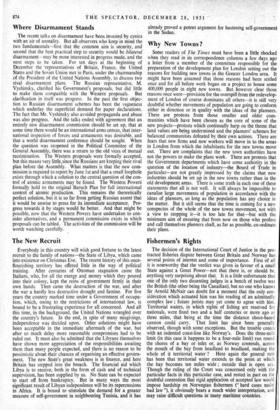Fishermen's Rights
The decision of the International Court of Justice in the pro- tracted fisheries dispute between Great Britain and Norway has several points of interest and some of importance. First of all it is noteworthy that the verdict was given in favour of a small State against a Great Power--not that there is, or should be, anything very surprising about that. It is a little unfortunate that one of the only two dissenting judges in a bench of twelve was the British (the other being the Canadian), but no one who knows Sir Arnold McNair can doubt for a moment that the only con- sideration which actuated him was his reading of an admittedly complex law ; future jurists may yet come to agree with him. Territorial waters, in which rights of fishing are reserved for nationals, were fixed two and a half centuries or more ago as three miles, that being at the time the distance shore-based cannon could carry. That limit has since been generally observed, though with some exceptions. •But the trouble comes with an indented coast-line like Norway's. Does the three-mile limit (in this case it happens to be a four-mile limit) run round the shores of a bay or inlet or, as Norway contends, across the mouth of the bay from headland to headland, making the whole of it territorial water ? Here again the general rule has been that territorial water extends to the point at which the bay becomes ten miles wide ; outside that is open sea. Though the ruling of the Court was concerned only with the particular facts in this particular case, and rested in part on the doubtful contention that rigid application of accepted law would impose hardship on Norwegian fishermen (" hard cases make bad law "), it obviously bears a much wider interpretation, and may raise difficult questions in 'many maritime countries.






























 Previous page
Previous page